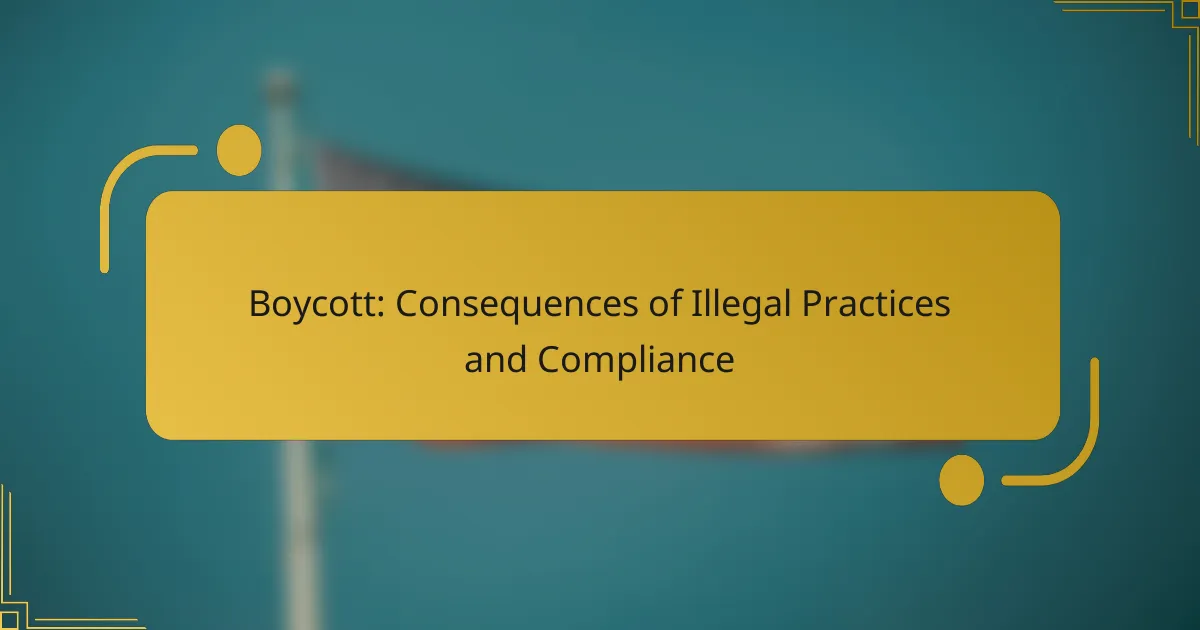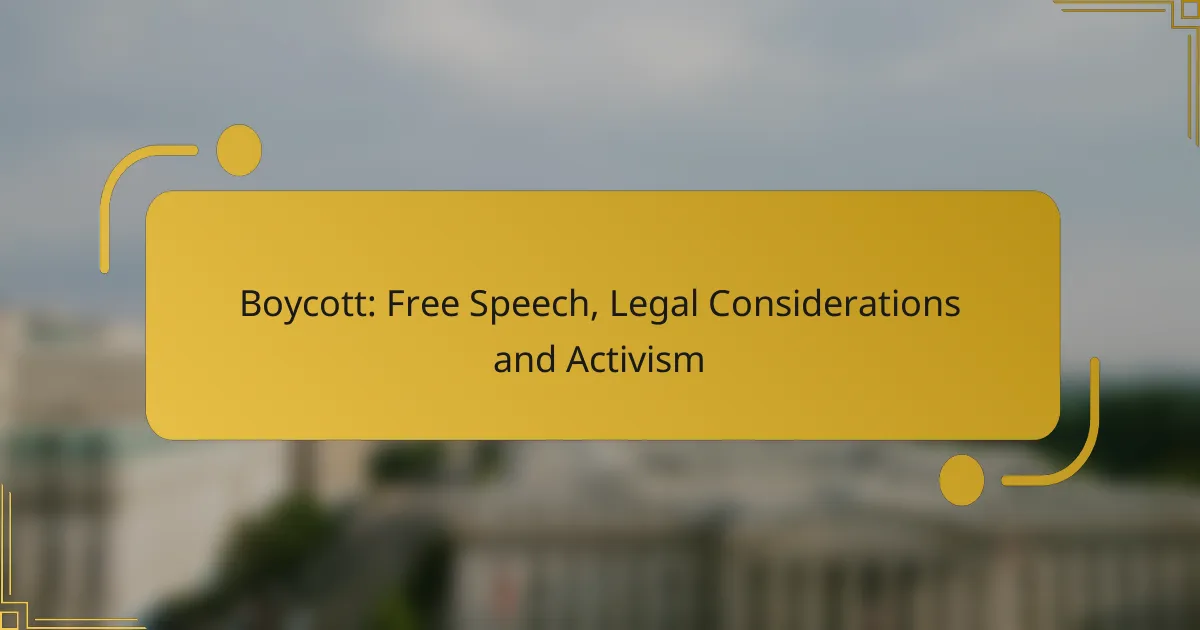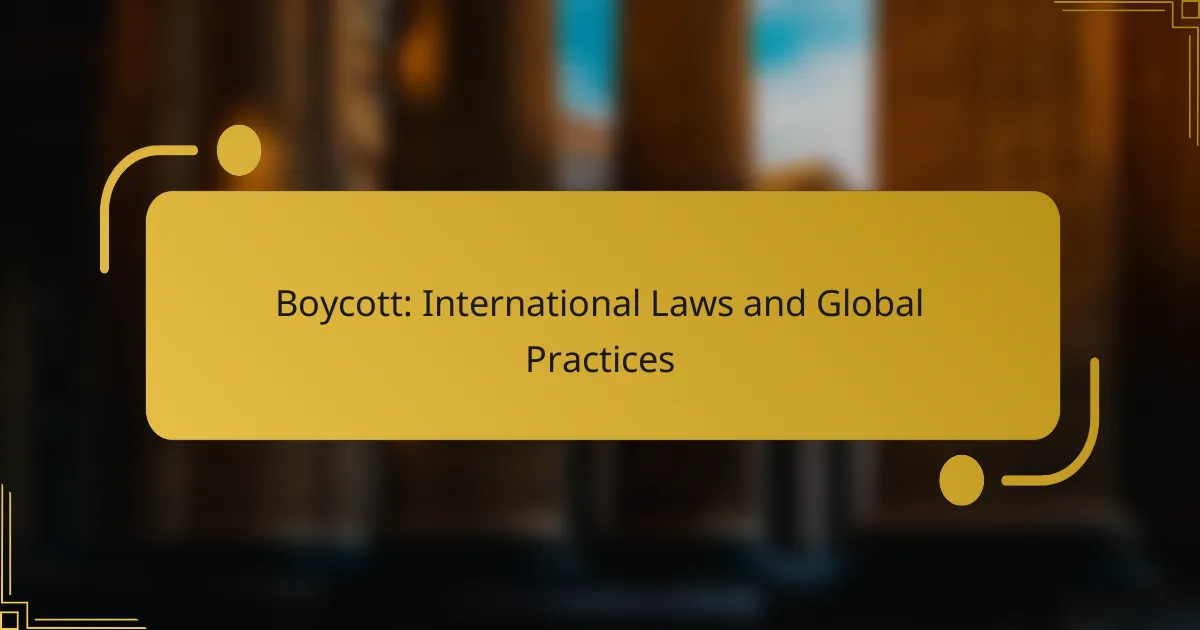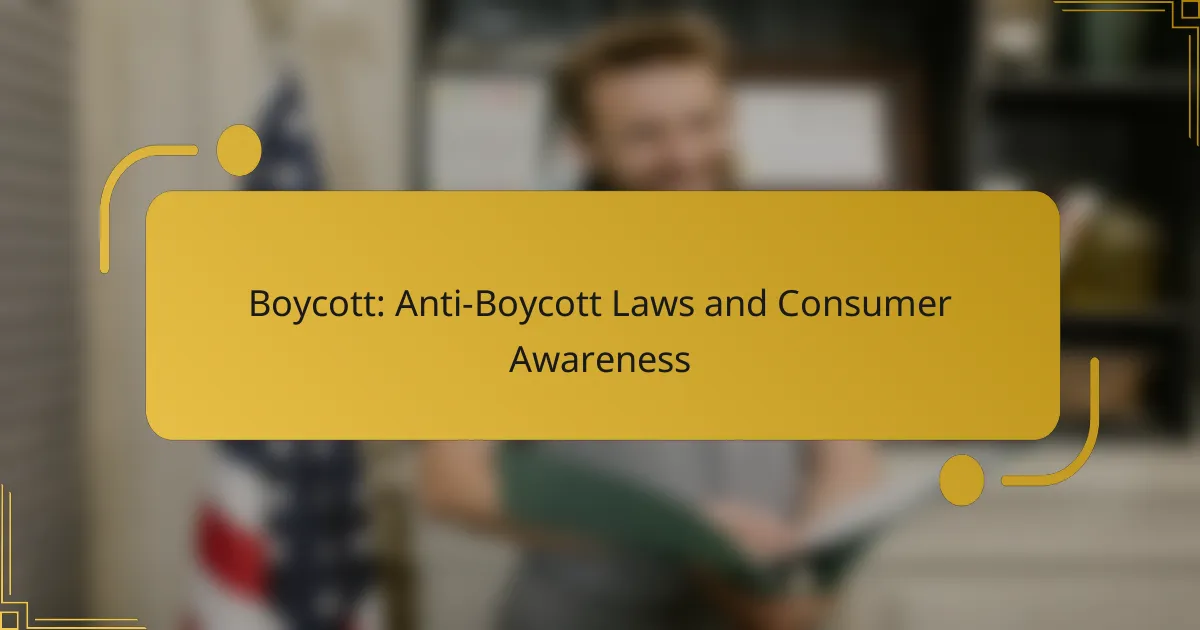The consequences of illegal practices in boycotts can be profound, affecting companies through legal penalties, reputational damage, and financial losses. To navigate these challenges, businesses must implement compliance programs and training to ensure adherence to regulations. Additionally, consumer participation in boycotts can significantly impact a company’s bottom line, highlighting the power of collective purchasing decisions.
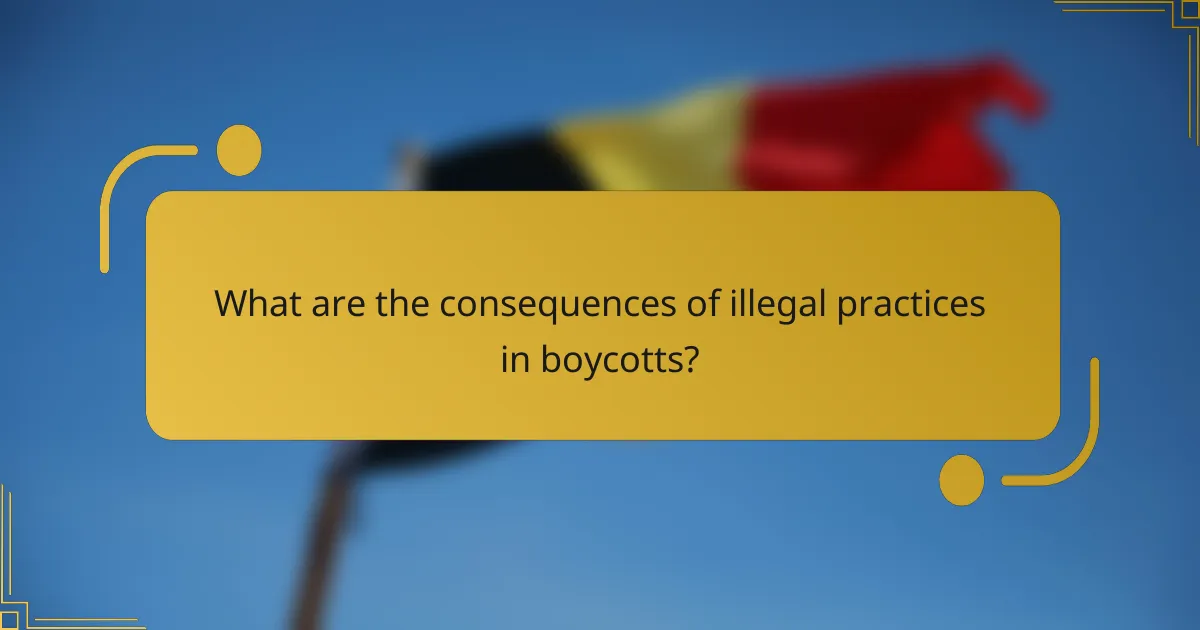
What are the consequences of illegal practices in boycotts?
The consequences of illegal practices in boycotts can be severe, impacting companies in various ways. These repercussions often include legal penalties, reputational harm, financial losses, diminished employee morale, and a decline in market share.
Legal penalties for companies
Companies engaging in illegal practices during boycotts may face significant legal penalties, including fines and sanctions. Regulatory bodies can impose these penalties based on violations of trade laws and anti-boycott regulations.
For instance, in the United States, the Office of Antiboycott Compliance enforces regulations that prohibit U.S. companies from complying with foreign boycotts that are not sanctioned by the U.S. government. Violations can lead to hefty fines and legal action.
Reputational damage to brands
Illegal practices in boycotts can severely damage a brand’s reputation. Consumers increasingly value ethical practices, and any association with illegal activities can lead to public backlash.
Brands may find themselves facing boycotts from their own customers, leading to negative media coverage and loss of trust. This reputational damage can take years to repair, affecting customer loyalty and brand perception.
Financial losses from reduced sales
Financial losses are a common consequence of illegal practices in boycotts, as companies may experience reduced sales due to customer backlash. When consumers choose to boycott a brand, the immediate impact can be a significant drop in revenue.
In some cases, financial losses can range from low tens of thousands to millions of dollars, depending on the size of the company and the scale of the boycott. Companies may also incur additional costs related to legal fees and crisis management.
Impact on employee morale and retention
Illegal practices in boycotts can negatively affect employee morale and retention. Employees may feel disillusioned or embarrassed to work for a company engaged in unethical behavior, leading to decreased productivity and job satisfaction.
High turnover rates can result from these issues, as employees seek to distance themselves from the company’s tarnished reputation. This can lead to increased hiring and training costs for the company.
Long-term market share decline
Over time, illegal practices in boycotts can lead to a decline in market share. As customers shift their loyalty to competitors who uphold ethical standards, companies may struggle to regain their previous standing in the market.
Market share decline can be exacerbated by ongoing negative publicity and the difficulty of rebuilding trust with consumers. Companies must actively work to restore their image to prevent long-term damage to their market position.

How can businesses ensure compliance with boycott regulations?
Businesses can ensure compliance with boycott regulations by implementing structured compliance programs, providing regular employee training, and establishing monitoring systems. These steps help mitigate risks associated with illegal practices and promote adherence to legal standards.
Implementing robust compliance programs
A robust compliance program serves as the foundation for adhering to boycott regulations. It should include clear policies, procedures, and guidelines that outline the company’s stance on compliance and the consequences of violations. Regularly reviewing and updating these programs is essential to adapt to changing regulations.
Consider integrating technology solutions that facilitate compliance tracking and reporting. This can streamline processes and ensure that all employees have access to the latest information regarding boycott regulations.
Regular training for employees
Regular training is crucial for ensuring that employees understand boycott regulations and the company’s compliance policies. Training sessions should be conducted at least annually, with additional sessions for new hires or when regulations change. This helps reinforce the importance of compliance and keeps staff informed about potential risks.
Utilizing real-life scenarios during training can enhance understanding. For example, discussing case studies of companies that faced penalties for non-compliance can illustrate the serious consequences of failing to adhere to regulations.
Monitoring and reporting mechanisms
Establishing effective monitoring and reporting mechanisms is vital for identifying potential compliance issues early. This may include regular audits, compliance checks, and anonymous reporting channels for employees to report concerns without fear of retaliation. Such systems promote transparency and accountability within the organization.
Consider using software tools that can automate monitoring processes and generate reports on compliance status. This can help management stay informed and take corrective actions promptly when necessary.
Engaging legal counsel for guidance
Engaging legal counsel is an important step for businesses to navigate the complexities of boycott regulations. Legal experts can provide tailored advice, ensuring that the company’s policies align with current laws and regulations. They can also assist in interpreting ambiguous regulations and help mitigate legal risks.
Regular consultations with legal counsel can help businesses stay updated on changes in legislation that may impact compliance. This proactive approach can prevent costly legal issues and enhance the company’s overall compliance strategy.
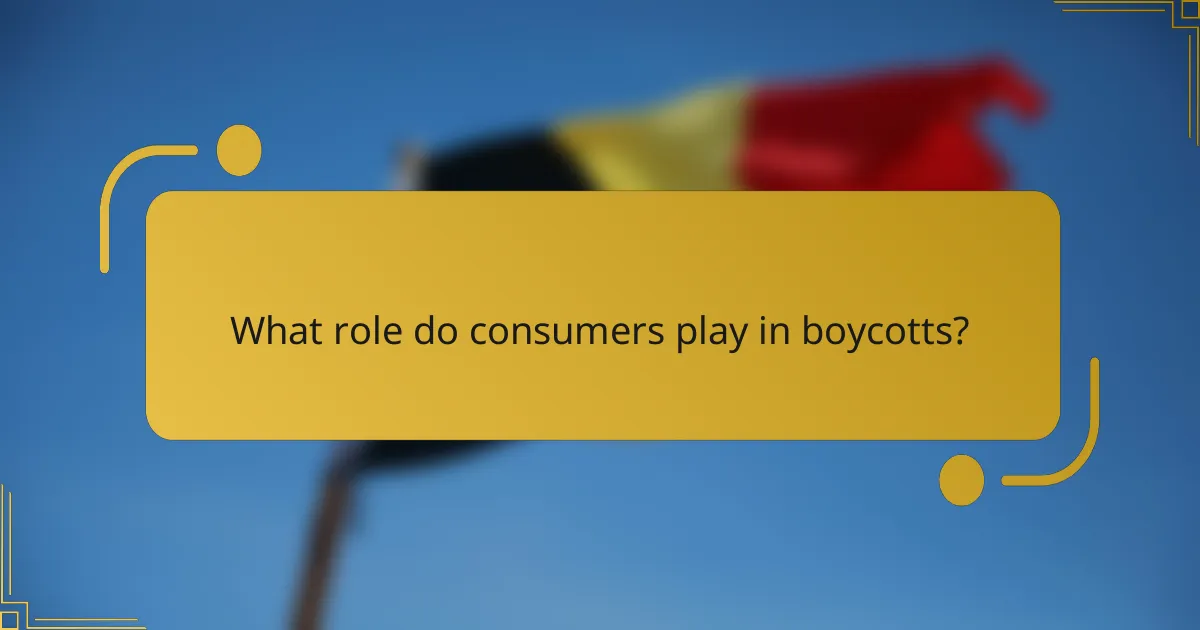
What role do consumers play in boycotts?
Consumers play a crucial role in boycotts by leveraging their purchasing power to influence companies’ practices. When consumers collectively refuse to buy products or services from a business due to unethical behavior, it can lead to significant financial consequences for that company.
Influencing corporate behavior
Boycotts can effectively prompt companies to change their practices by demonstrating that unethical behavior leads to financial loss. For instance, when consumers boycott a brand over labor violations, the company may reconsider its policies to regain customer trust and sales.
Companies often monitor public sentiment closely. A well-organized boycott can lead to immediate changes in corporate policies, such as improving labor conditions or adopting more sustainable practices, as businesses aim to align with consumer values.
Driving awareness of ethical issues
Boycotts serve as a powerful tool for raising awareness about ethical issues, such as environmental concerns or human rights violations. By participating in a boycott, consumers can highlight specific problems that may not be widely recognized.
Through media coverage and public discussions, boycotts can bring attention to injustices, encouraging more consumers to educate themselves and take action. This ripple effect can lead to broader societal changes beyond the immediate economic impact on a company.
Participating in social media campaigns
Social media campaigns are integral to modern boycotts, allowing consumers to organize and spread their message quickly. Platforms like Twitter and Instagram enable users to share information, mobilize support, and amplify their voices on ethical issues.
Effective social media campaigns often include hashtags, graphics, and calls to action, making it easier for consumers to participate and share their stance. Engaging content can attract attention and encourage others to join the boycott, increasing its overall impact.
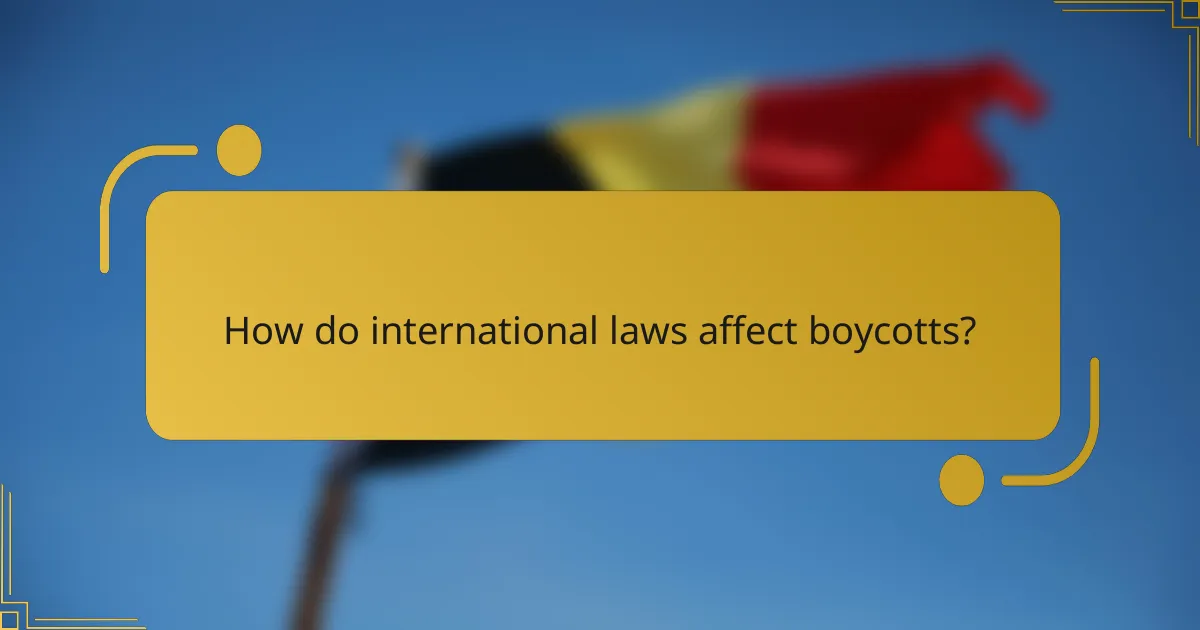
How do international laws affect boycotts?
International laws significantly influence the legality and effectiveness of boycotts. These laws can vary widely, impacting how businesses and individuals navigate compliance and potential legal repercussions.
Variations in legal frameworks across countries
Different countries have distinct legal frameworks that govern boycotts, which can lead to varying consequences for participants. For instance, some nations may impose strict penalties for engaging in boycotts against certain states, while others may support or even encourage such actions. Understanding the specific laws in each jurisdiction is crucial for anyone considering a boycott.
In the European Union, for example, regulations may protect certain boycotts under human rights considerations, whereas in the United States, anti-boycott laws can penalize businesses that comply with foreign boycotts against Israel. This disparity necessitates careful legal assessment before initiating any boycott.
Impact of trade agreements on compliance
Trade agreements can significantly affect compliance with boycott regulations by establishing rules that member countries must follow. These agreements often include clauses that address trade restrictions and may limit the ability to impose boycotts without facing penalties or trade sanctions.
For instance, the North American Free Trade Agreement (NAFTA) includes provisions that discourage discriminatory practices against member countries. Businesses engaged in international trade should review relevant trade agreements to understand their obligations and the potential risks associated with boycotts.
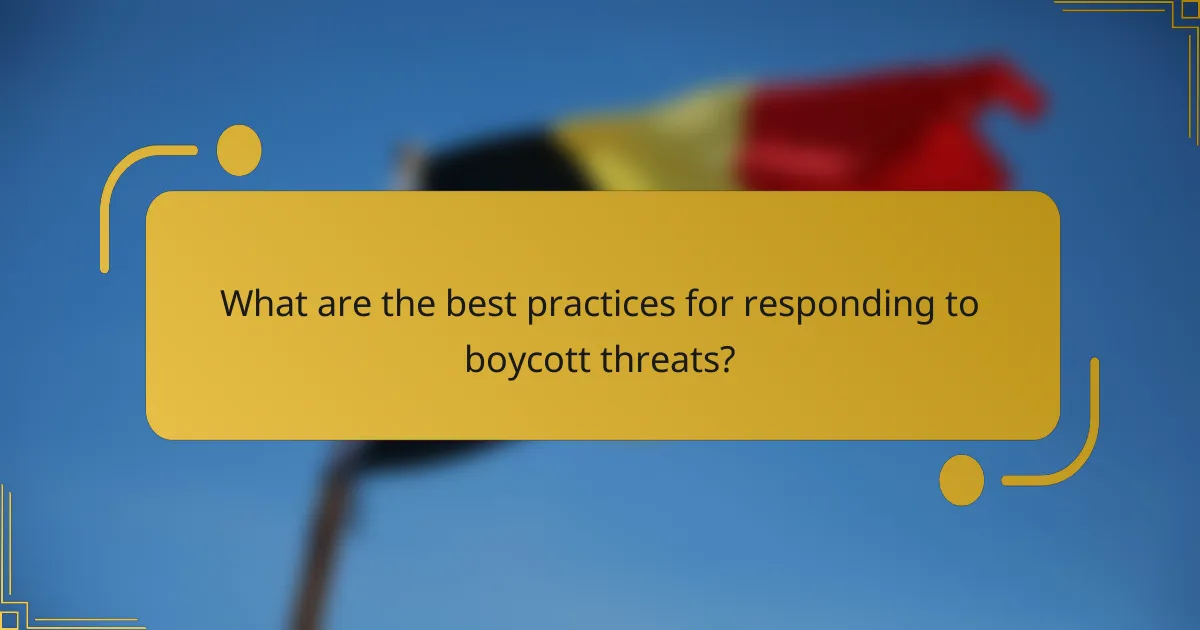
What are the best practices for responding to boycott threats?
Effective responses to boycott threats involve proactive engagement, transparent communication, and strategic planning. Organizations should prioritize understanding the concerns behind the boycott and addressing them directly to mitigate potential impacts.
Proactive communication strategies
Proactive communication strategies are essential in managing boycott threats. Companies should establish clear channels for dialogue with stakeholders, including customers, employees, and the community. This can involve regular updates through newsletters, social media, or public statements to keep all parties informed.
Additionally, organizations should actively listen to the concerns raised by potential boycotters. Conducting surveys or focus groups can provide valuable insights into public sentiment and help tailor responses that resonate with the audience. Transparency in addressing these concerns can build trust and potentially diffuse tensions.
It is also beneficial to prepare a crisis communication plan that outlines key messages and designated spokespeople. This plan should include guidelines for responding to media inquiries and public comments, ensuring that the organization presents a unified and consistent message. Regular training for staff on these protocols can enhance preparedness and responsiveness during a boycott threat.
